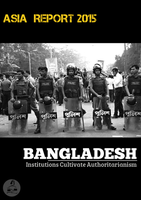
International Human Rights Day offers one more opportunity to streamline the discourse on human rights. The achievements in terms of the development of normative standards have been immense in the last decades. These achievements are not reflected in people’s real life, despite certain public awareness about rights being made. Together with its success in building awareness, the human rights community must also shoulder responsibility for its failure in promoting the realisation of rights.
When the human rights community and civil society have implemented numerous projects on human rights in the last several decades, why are thousands of people tortured daily at the hands of law-enforcement agencies in Bangladesh? Why are extrajudicial executions happening routinely and recurrently without any consequences? Why are people being forcibly disappeared by known and unknown agents of the State? Why are mere satirical comments about powerful people on a social networking site reason for detention and imprisonment? Why are newspaper editors and television channel owners detained, while offenders of cognizable offences are rewarded with various positions and gallantries of the State? What institutions are in place to hold the offenders accountable in accordance with the law?
 The human rights community needs to rethink its approach of leading the country’s human rights movement. Although teaching people about international human rights treaties or documenting cases of rights abuse are important, repeated such teachings and documentation have not changed the attitudes of the policing system, which should be acknowledged. It is important to consider how much analysis has been done on the basis of such documentation. While rights can be conceived at the United Nations’ Human Rights Council, the realisation and protection of these rights fully depends on domestic justice institutions of any given country. Without competent justice institutions, people’s rights, regardless of what the national constitution or international law guarantees, will never be protected from the brutal law-enforcement agencies of Bangladesh. So, how much attention has been given to examine the institutions that must act independently to protect people’s rights?
The human rights community needs to rethink its approach of leading the country’s human rights movement. Although teaching people about international human rights treaties or documenting cases of rights abuse are important, repeated such teachings and documentation have not changed the attitudes of the policing system, which should be acknowledged. It is important to consider how much analysis has been done on the basis of such documentation. While rights can be conceived at the United Nations’ Human Rights Council, the realisation and protection of these rights fully depends on domestic justice institutions of any given country. Without competent justice institutions, people’s rights, regardless of what the national constitution or international law guarantees, will never be protected from the brutal law-enforcement agencies of Bangladesh. So, how much attention has been given to examine the institutions that must act independently to protect people’s rights?
The judges of Bangladesh should ask what role the Judiciary has so far played to address the plight of families whose dear ones have been disappeared for months or years. They must ask how many times each of them, individually or collectively, have held the perpetrators of extrajudicial executions accountable before the Courts? In contrast, how many allegations of torture, extrajudicial executions, enforced disappearances, arbitrary detentions, and many other forms of gross abuses have not been bothered by the judiciary? How do the police behave with the people, and for what reasons? How are the investigations done, and how credible are they? What qualities does the prosecutorial system have to assist the Courts to uphold justice? What prevents Judges from saying “No” to the executive’s interferences during a trial? What prevents the justice institutions from administering justice to victims in Bangladesh, and what needs to be changed?
If there are true interests for protecting the people from human rights abuses, there must be trustworthy engagements for examining the country’s justice institutions. Proper knowledge about the detailed features, behaviours, attitudes, patterns, and challenges of the policing, prosecution, and judiciary, as well as the politics surrounding these institutions can lead the nation to think about its future needs. Adequate examination of the institutions can enhance knowledge about the depth of the problems, which will ultimately compel everyone to accept that rebuilding the justice institutions is a must. If achieving human dignity beyond any discrimination and living a life without any human rights abuse is the priority of the people, if a just society is every citizen’s aspiration, then the nation needs to begin with rebuilding its justice institutions.